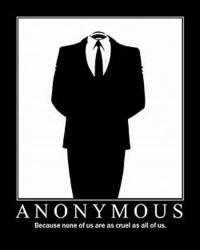Article by: Alex Pearlman
There is a group of people out there in the virtual world who are working for all of us, protecting our liberties as free-thinking humans, standing up to tyranny, and keeping governments accountable to their citizens. These people, in an unprecedented attack of cyber radicalism, took down the Australian government’s internet servers intermittently for two days and have threatened to continue their attacks until Australia ceases its seriously silly proposed stifling of free speech via an internet filter that would monitor “unwanted content.”
Anonymous, which gained fame for widespread protests against the Church of Scientology in the winter of 2008, warned the Australian government of the impending attack, dubbed Operation Titstorm, in a video that was released and spread virally across the servers of the world like wild fire.
As expected, up to 10 (accounts differ) government websites were taken down by a DDOS attack, including the site for the Australian Parliament and, according to Wired.com, within 18 minutes of the first attack, the Prime Minister’s site. Communications Minister Stephen Conroy, who proposed the ISP-level internet filter, (which is China-esque, as far as Internet censorship goes) also got his site attacked.
Many have celebrated Anonymous’ most recent protests, but some, including those who are against the Australian government’s steps against free speech condemned the attacks.
“By attempting to bring down or deface government websites, a minority of Internet users have brought negative attention to what is a very important issue for Australians,” said Nicholas Perkins of Stop Internet Censorship, an activist organization. “It would be much more helpful for these people to put their efforts behind legitimate action to stop this ineffective and inefficient attempt at censorship by the Australian government.”
The System Administrators Guild of Australia was also understandably upset about the extra work they were required to do and a spokeswoman for Communications Minister Conroy said the attacks were not a legitimate form of political statement, according to the Sydney Morning Herald. “They were ‘totally irresponsible and potentially deny services to the Australian public.’”
Still, whatever mess was made, Anonymous’ attack is a clear indication that Internet censorship is not to be taken lightly. China’s Green Dam software and other such monitoring systems have already taken the highly concerning step over the line of controlling what people can read and see and Anonymous, no matter who they upset, were well within their rights to make their grievances known to the government: that’s the idea that free countries are based on.
Below is the transcript from the video.
“Greetings Australian Government Officials, Members of Local and International Press, and the General Public. We are Anonymous.
Over the past several years, we have maintained a close watch on the actions of the Australian Government with particular focus on its stance towards internet censorship.
Australia’s laws on internet censorship are already among the most restrictive in the western world. Their government filters more internet content than any other Parliamentary Democracy. For some elements within the Government, including Telecommunications Minister Senator Stephen Conroy, this still is not enough. Late in January of 2009 he proposed legislature that would lead to mandatory ISP filtering for all of Australia. The stated goal is to prevent Australia from viewing “illegal and unwanted content” on the internet.
Anonymous’ concern with this legislature is twofold.
First, the ambiguity of the term “unwanted content” is completely unacceptable. No government should have the right to refuse its citizens access to information solely because they perceive it to be “unwanted.” Indeed, the only possible interpretation of “unwanted content” is content that the government itself does not want to be seen.
More importantly, Anonymous does not approve of the steps already undertaken by the Australian Government to control what their populous sees. Claiming to be cracking down on “simulated child pornography,” many depictions of women with small breasts in pornography have been banned. Officials cannot claim that they believe the models in these movies are in fact underage, as the production the titles that have been affected are heavily regulated to ensure the age of the models. Instead they are relying on earlier ambiguous wording that allows pornography featuring models that “appear to be” under 18 years of age to be treated in the same manner as actual child pornography.
The repercussions of this censorship of a natural body type on the psyche of Australian women cannot be understated, but this is not Anonymous’ concern. The Australian Government will learn that one does not mess with our porn. No one messes with our access to perfectly legal (or illegal) content for any reason.
“We are Legion.
We do not Forgive.
We do not Forget
Expect us.”













